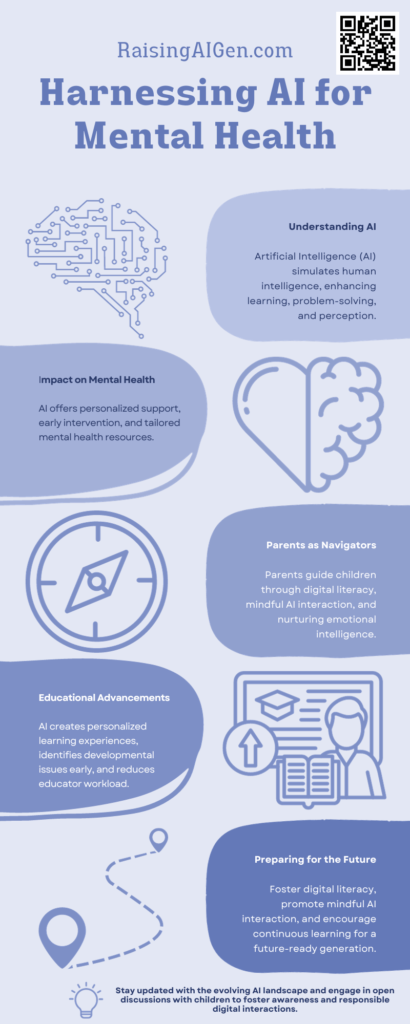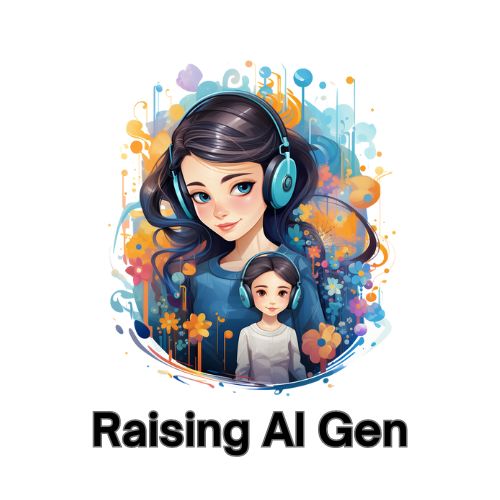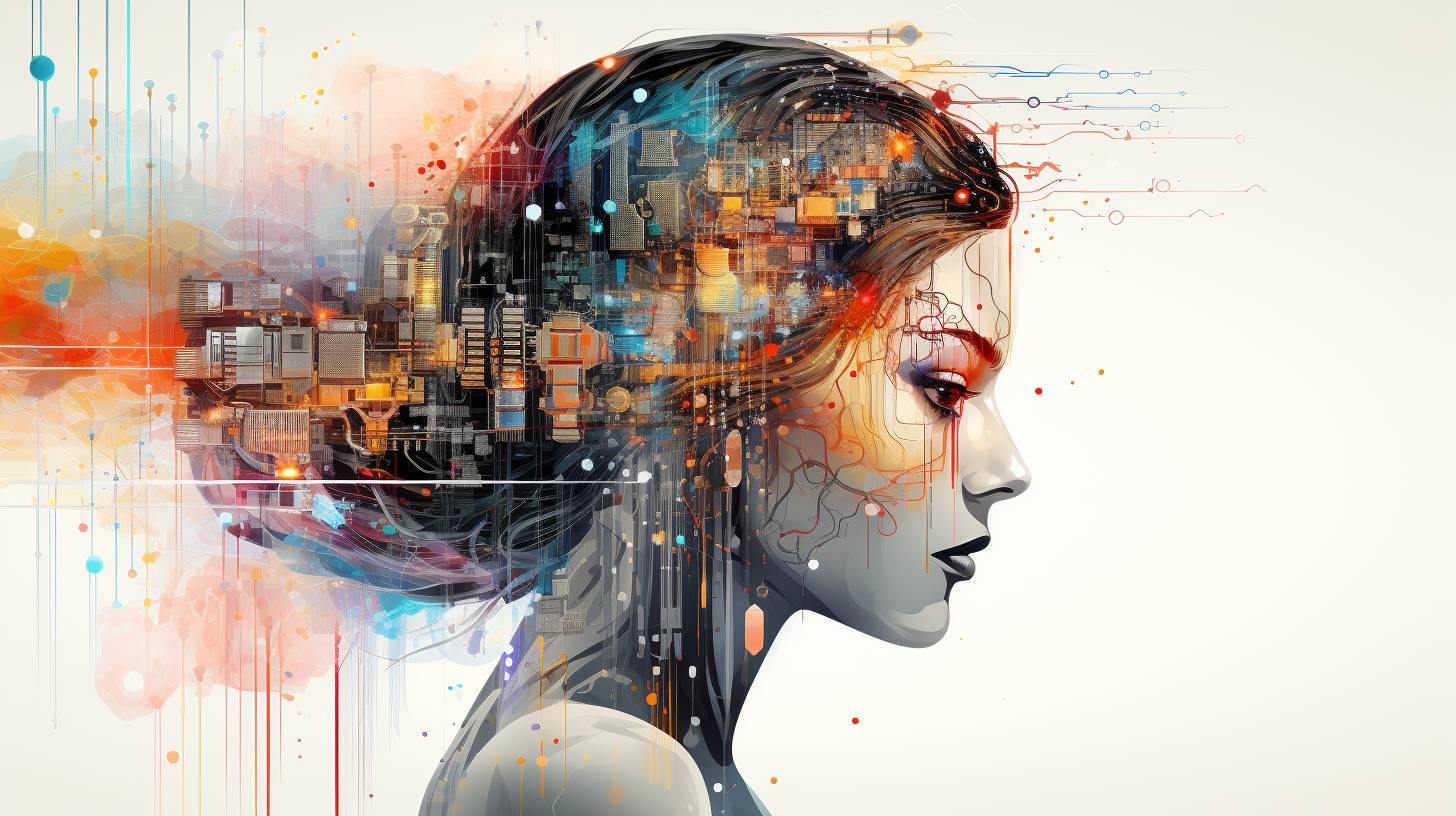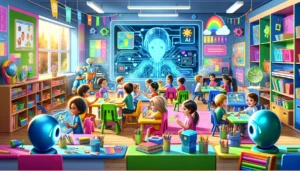In a world that’s rapidly embracing the digital frontier, the phrase “Is there an AI for mental health?” isn’t as futuristic as it once sounded. Artificial Intelligence (AI), once a staple of sci-fi narratives, is now deeply woven into the fabric of our daily lives. From smart homes that understand our preferences to virtual tutors aiding in our children’s education, the touch of AI is unmistakable. But beyond the convenience and innovation, lies a realm that touches the core of our being – our mental health. As parents navigating this AI-driven cosmos, understanding the impact of AI on mental health, especially in the nurturing and education of our children, is crucial. This exploration is not just about the technological wonder that AI embodies, but about its profound intersection with our mental, emotional, and psychological well-being.
This article aims to delve into the crux of AI and mental health, shedding light on how the former can be harnessed to support the latter, particularly in an educational and parenting milieu. As we venture through the realms of parenting in this age of Artificial Intelligence, the potential to foster a nurturing environment for our children’s mental health emerges from the confluence of technology and empathy.

Quick Takes
Section Key Takeaways Understanding AI and Mental Health Definition of AI, mental health challenges, potential AI solutions for mental health. Navigating the AI-Driven World: Parenting in the Age of AI Challenges and opportunities of AI in parenting. AI in Education: A Focus on Mental Health Revolution of education through AI, implications on mental health. The Parental Perspective: Guiding Children through an AI-Driven World Role of parents, guiding children through AI challenges and opportunities. Real-World Applications: Is There an AI for Mental Health? Existing AI applications for mental health, how parents can leverage these technologies. Preparing for the Future: What Parents Need to Know Preparing children for an AI-driven future, maintaining mental well-being.
Through the subsequent sections, we will explore, analyze, and envisage the landscape where AI meets mental health, aiming to equip parents with the knowledge and resources necessary to steer through the challenges and opportunities that lie ahead.
Understanding AI and Mental Health
In the vast expanse of modern technology, Artificial Intelligence (AI) shines as a beacon of potential and innovation. However, to harness its benefits in the realm of mental health, a deeper understanding is imperative. This section serves as a gateway to comprehending the essence of AI and the tapestry of mental health challenges, paving the way for a discussion on how the fusion of the two can usher in a new era of support and understanding.
What is Artificial Intelligence (AI)?
At its core, Artificial Intelligence is the simulation of human intelligence processes by machines, especially computer systems. These processes include learning, reasoning, problem-solving, perception, language understanding, and potentially self-correction. The charm of AI lies in its ability to learn and adapt, offering solutions that evolve with the challenges at hand.
The Spectrum of Mental Health Challenges
Mental health is a continuum that ranges from optimal functioning to severe disorders. Parents and children alike traverse this spectrum, facing challenges that may include stress, anxiety, depression, and other mental health conditions. The dynamics of modern living often exacerbate these issues, making the quest for mental well-being a paramount concern.
AI as a Tool for Mental Health
In the juxtaposition of AI and mental health, lies the promise of support and empowerment. AI, with its data-driven insights and predictive capabilities, holds the potential to offer personalized support. Whether it’s through AI-powered applications that provide therapeutic support or platforms that foster community and understanding, the amalgamation of AI with mental health resources can serve as a catalyst for positive change.
The intersection of AI and mental health is a burgeoning field, filled with potential to provide a supportive scaffold on which individuals and families can lean on. As we navigate further into the realms of AI in parenting and education, the understanding of AI’s role in mental health becomes a cornerstone for fostering a nurturing environment for our children.
Navigating the AI-Driven World: Parenting in the Age of Artificial Intelligence
The advent of Artificial Intelligence (AI) has not only reshaped the landscape of technology but has also left an indelible mark on the quintessence of parenting. The fusion of AI with parenting presents a gamut of opportunities and challenges. This section endeavors to elucidate the intricacies of parenting in this AI-imbued epoch and how it intertwines with mental health.
The Impact of AI on Parenting
In an age where digital footprints are cast from the cradle, parents find themselves at the crossroads of tradition and modernity. AI has become a companion in the parenting journey, offering tools that promise to ease the multifaceted responsibilities that come with nurturing a child. From smart baby monitors to AI-driven educational apps, the digital aide at a parent’s disposal is boundless. However, with great potential comes the imperative for mindful engagement to ensure the mental well-being of both parents and children.
The Double-Edged Sword: Opportunities and Challenges
AI offers a plethora of opportunities for modern parenting. It provides avenues for personalized learning, early detection of developmental or health issues, and the automation of mundane tasks, thereby allowing more quality time between parents and children. On the flip side, the challenges are palpable. The potential for over-reliance on AI, privacy concerns, and the essential human touch that AI lacks, pose questions that beckon contemplation and balanced action.
Fostering a Healthy AI-Parenting Ecosystem
Striking a harmonious balance between leveraging AI and preserving the human essence of parenting is pivotal. A healthy AI-parenting ecosystem is one where AI acts as a support rather than a replacement. Engaging with AI mindfully, understanding its limits, and ensuring a holistic approach to parenting that prioritizes mental health, can pave the way for a nurturing and supportive environment for children.
As we delve deeper into the narrative of AI in education and its impact on mental health, the role of parents as discerning navigators becomes quintessential. The voyage through the AI-driven world is nuanced, and as parents, the compass of mindful engagement and a focus on mental health can lead towards a journey filled with growth, understanding, and enhanced well-being for the entire family.
AI in Education: A Focus on Mental Health
The realm of education is a significant facet of the discussion surrounding AI and mental health. As the modern classroom evolves, integrating various forms of technology, AI emerges as a potent tool with the ability to revolutionize learning experiences. However, this transition comes with its own set of implications for the mental health of both students and educators. This section aims to dissect the impact of AI on the educational sector and its reverberations on mental health.
Revolutionizing Learning Experiences
AI has the potential to create personalized learning pathways, adapting to the individual needs and capabilities of each student. This personalized approach can alleviate the stress often associated with a one-size-fits-all educational model, promoting a more positive learning experience and potentially improving mental health outcomes. Additionally, AI can provide real-time feedback, allowing for immediate adjustment and fostering a more supportive learning environment.
Early Detection and Support
One of the profound benefits of AI in education is its ability to identify potential learning or developmental issues at an early stage. By analyzing patterns and behaviors, AI can help educators and parents intervene early, providing the necessary support and resources. This early intervention can be crucial in managing and mitigating the mental health challenges that may arise from learning difficulties.
The Teacher’s Perspective: Easing the Load
Educators too stand to benefit from the integration of AI in the classroom. By automating administrative tasks and providing smart analytical insights, AI can significantly reduce the workload on teachers, allowing them more time to focus on the individual needs of their students. A reduced workload can lead to decreased stress levels, positively impacting the mental health of educators.
Navigating the Ethical Landscape
With great power comes great responsibility, and the integration of AI in education is no exception. The ethical considerations, particularly around data privacy and the potential for bias, are critical aspects that need careful navigation. Ensuring a transparent, ethical, and inclusive AI-driven educational system is imperative to foster a positive impact on mental health.
The intertwining of AI in education opens doors to a myriad of possibilities that can significantly impact mental health. The balance between leveraging the benefits of AI while maintaining a keen awareness of its ethical and mental health implications will be the linchpin in fostering a nurturing and supportive educational environment. As we transition into an era where technology becomes an integral part of the educational fabric, the holistic consideration of its impact on mental health becomes indispensable.
The Parental Perspective: Guiding Children through an AI-Driven World
In this digital epoch, parents are the compass guiding their children through the complex landscape shaped by Artificial Intelligence. The journey is filled with learning, adaptation, and an opportunity to foster a nurturing environment that bolsters mental health. This section elucidates the pivotal role parents play in steering their children through the challenges and opportunities presented by an AI-driven world.
The Role of Parents
Parents are the first line of support, guidance, and education for their children. In a world progressively intertwined with AI, the parental role extends to include digital literacy and awareness. By fostering a balanced and mindful interaction with AI technologies, parents can create a supportive environment that promotes mental well-being, personal growth, and a healthy curiosity about the world.
Guiding Through Challenges
The path is not without its hurdles. The potential drawbacks of AI, such as data privacy issues, over-reliance on technology, and the potential for reduced human interaction, are challenges that parents must navigate with care. Guiding children through these challenges, educating them about the ethical use of AI, and promoting a balanced lifestyle are crucial steps in ensuring their mental and emotional well-being.
Embracing Opportunities
On the flip side, the AI-driven world presents a plethora of opportunities for enriching the learning and developmental journey of children. From personalized learning experiences to the development of critical thinking and problem-solving skills, AI has a lot to offer. Parents can act as facilitators, helping their children to harness the benefits of AI while fostering a culture of continuous learning and mental resilience.
Preparing for the Future
As the torchbearers of the next generation, parents have the responsibility to prepare their children for a future where AI will be an integral part of society. This preparation goes beyond just technical knowledge; it encompasses building a strong mental and emotional foundation that will enable children to thrive in an AI-driven world.
The voyage through the AI-driven world is nuanced and filled with both challenges and opportunities. Parents, armed with knowledge, awareness, and a focus on mental health, are the compass guiding their children through this journey. By embracing a balanced approach towards AI, parents can help shape a positive, supportive, and enriching environment that fosters mental well-being and prepares children for the future that awaits them.
Real-World Applications: Is There an AI for Mental Health
The integration of Artificial Intelligence (AI) within the sphere of mental health has birthed a multitude of applications aimed at enhancing mental health outcomes. These AI-driven applications are not merely abstract concepts but are making tangible impacts in the lives of individuals globally. Here are some notable real-world applications of AI for mental health:
Therapeutic AI Chatbots
The emergence of AI-driven chatbots as virtual therapists is a stride towards making mental health support more accessible and less stigmatized. These chatbots, equipped with machine learning and natural language processing capabilities, can provide immediate support, coping strategies, and even guide individuals to professional help when needed. For instance, certain chatbots employ Cognitive Behavioral Therapy (CBT) techniques to provide support to individuals seeking help (NCBI).
Predictive Analysis for Early Intervention
Harnessing AI for predictive analysis can be a game-changer in the realm of mental health. By analyzing behavioral patterns and data trends, AI can help in identifying potential mental health issues at an early stage. Early intervention, facilitated by accurate predictions, can provide the necessary support and resources to individuals, thereby mitigating the severity of mental health conditions.
Personalized Mental Health Apps
Personalized mental health applications powered by AI offer a tailored approach to mental health support. By understanding the unique needs and preferences of individuals, these apps provide personalized coping strategies, mindfulness exercises, and mental health resources, fostering a supportive digital environment for mental well-being. The World Economic Forum highlights how AI is boosting mental healthcare by personalizing treatment plans and training therapists (WEF).
Virtual Support Groups
Virtual support groups, powered by AI, are redefining the concept of community in the digital age. These platforms connect individuals facing similar mental health challenges, creating a virtual support network that fosters a sense of belonging and provides a platform for shared experiences and coping strategies.
AI in Professional Mental Health Services
The integration of AI in professional mental health services is augmenting patient care quality. From AI-driven diagnostic support to data-driven treatment planning, the infusion of AI technology is enhancing the quality and efficacy of mental health services. For example, AI contributes to proactive and objective assessment of mental health symptoms to aid in diagnosis and treatment delivery, including long-term monitoring and care management (Frontiersin).
AI in Therapy Support
AI is also making waves in supporting therapy, especially in regions where mental health services are under-resourced. The BBC discusses how AI could potentially offer solutions by aiding therapy and mental health services worldwide, showcasing the global impact AI can have in this domain (BBC).
Preparing for the Future: What Parents Need to Know
As the delineation between the digital realm and the tangible world continues to blur, preparing for a future where AI is as ubiquitous as electricity becomes imperative. For parents, this preparation transcends the physical realm and enters the domain of mental and emotional readiness. This section aims to equip parents with the insights necessary to prepare themselves and their children for an AI-integrated future while prioritizing mental health.
Building Digital Literacy
In a world augmented by AI, fostering digital literacy is no longer optional. Parents need to equip themselves and their children with the knowledge and skills necessary to navigate the digital landscape responsibly. Understanding the basics of AI, its potential, and its limitations is crucial in fostering a healthy interaction with technology.
Promoting Mindful Interaction with AI
Mindfulness in interaction with AI technologies goes a long way in ensuring the mental well-being of the family. Encouraging a balanced use of technology, understanding the implications of digital footprints, and fostering a culture of digital detox are essential steps towards promoting mental health in an AI-driven world.
Nurturing Emotional Intelligence
In a future dominated by artificial intelligence, human emotional intelligence becomes a priceless asset. Nurturing emotional intelligence in children, fostering empathy, and teaching them the importance of human connection are crucial steps in preparing them for a future where the human touch will be irreplaceable.
Encouraging Continuous Learning and Adaptation
The pace of technological advancement necessitates a culture of continuous learning and adaptation. Encouraging curiosity, critical thinking, and a love for learning will not only prepare children for a future of unknowns but also foster mental resilience in the face of change.
Advocating for Ethical AI
As AI continues to permeate every facet of life, advocating for ethical AI practices becomes a responsibility. Parents can take the lead in promoting transparency, fairness, and inclusivity in AI technologies, ensuring a safer and more equitable digital world for their children.
The journey towards an AI-integrated future is laden with both promise and challenges. The role of parents as guides and advocates in this journey is paramount. By taking proactive steps in understanding AI, promoting mental health, and preparing for the future, parents can ensure a smoother transition into a world where AI will play a significant role in everyday life. Through mindful preparation and a focus on mental health, we can look forward to a future where AI augments our lives, making the world a better place for the coming generations.
Charting the Course: Navigating the AI Horizon
As we stand on the cusp of an era where the fusion of Artificial Intelligence and mental health is set to redefine the paradigms of support, education, and parenting, the journey ahead holds promise laced with challenges. The narrative woven through the preceding sections elucidates not just the transformative potential of AI, but the essential role of parents in steering this transformation towards fostering mental health and well-being.
We delved into the essence of AI, its intersection with mental health, and the various realms where this intersection manifests – be it in education, parenting, or real-world applications aimed at mental health support. The insights gleaned pave the way for understanding, adaptation, and proactive action.
The compass for navigating this journey lies in a balanced approach. Embracing the opportunities AI presents, whilst remaining acutely aware of its challenges, and nurturing a culture of ethical engagement, continuous learning, and mental health awareness.
As parents, educators, and conscientious members of the digital society, the onus of fostering a nurturing, supportive, and mentally healthy environment for our children rests upon our shoulders. It is a collective endeavor that calls for informed action, empathy, and a steadfast focus on mental well-being.
The horizon of AI beckons with potential. As we chart the course towards this horizon, let us do so with a spirit of inquiry, the armor of knowledge, and a heart full of empathy. The voyage is as transformative as the destination, and as we navigate the AI landscape, let’s ensure that mental health remains our guiding star.
May this exploration serve as a catalyst for thought, discussion, and action as we step into the future, hand in hand with AI, towards creating a world where technology and humanity coalesce to nurture mental health and holistic well-being.
Frequently Asked Questions
| Question | Answer |
| What is Artificial Intelligence (AI)? | Artificial Intelligence (AI) refers to the simulation of human intelligence processes by machines, especially computer systems. These processes include learning, reasoning, problem-solving, perception, and language understanding. |
| How can AI impact mental health? | AI can impact mental health in several ways. It can provide personalized support through therapeutic AI chatbots, enable early intervention through predictive analysis, and offer personalized mental health resources through AI-powered apps. |
| What role do parents play in an AI-driven world? | Parents play a crucial role as guides, educators, and support systems for their children in an AI-driven world. They can foster digital literacy, promote mindful interaction with AI, nurture emotional intelligence, and encourage continuous learning and adaptation. |
| How can AI benefit education? | AI can revolutionize education by creating personalized learning experiences, providing real-time feedback, identifying learning or developmental issues early, and reducing the workload on educators through automation and smart analytical insights. |
| What are some real-world applications of AI for mental health? | Some real-world applications of AI for mental health include therapeutic AI chatbots, predictive analysis for early intervention, personalized mental health apps, virtual support groups, and AI integration in professional mental health services. |
| How can parents prepare for a future intertwined with AI? | Parents can prepare by fostering digital literacy, promoting mindful interaction with AI, nurturing emotional intelligence in their children, encouraging continuous learning, and advocating for ethical AI practices. To learn more about AI in education please refer to Classroom AI Uncovered: Myths, Realities, and Future Prospects. |






Pingback: Minds and Machines: How is AI Used in Mental Health to Shape Tomorrow’s Care? - raisingaigen.com